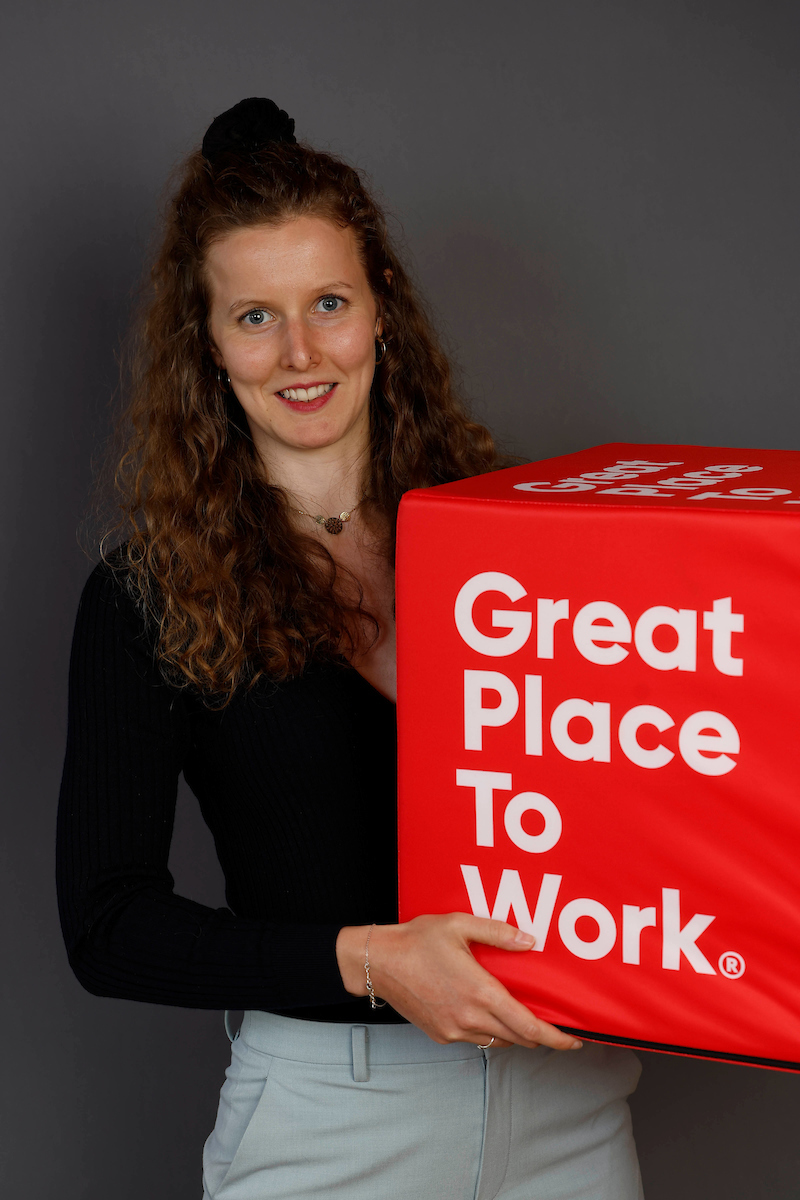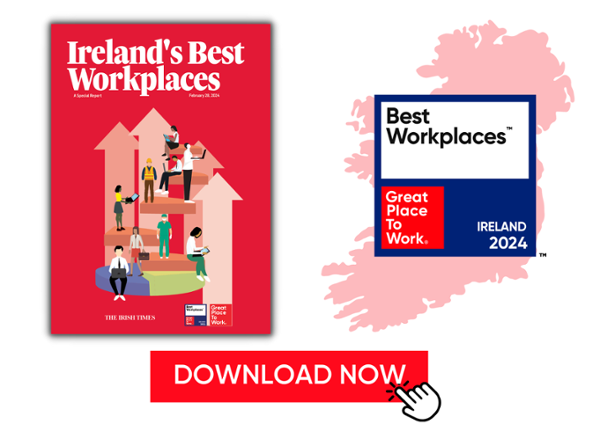
In recent years, parental leave has gained significant attention, challenged traditional gender roles and promoted gender equality in the workplace and at home. One such significant development is the introduction of paternity leave. This allows new parents (other than the mother of the child) to actively participate in childcare responsibilities. Ireland has embraced the idea of paternity leave, recognising the importance of the other parent in nurturing their children and fostering a more equitable society.
This blog delves into paternity leave in Ireland and its far-reaching effects on families, businesses, and gender equality. We will also shine a spotlight on three great workplaces in Ireland - Sun Life, Toast and LotusWorks - to understand how they offer and support paternity leave. To provide further insight, two of our Great Place to Work Ireland team members will also share their personal experiences. They will highlight the importance of employer support in this life event.
Paternity Leave in Ireland
Paternity Leave in Ireland came into effect on September 1st, 2016, under the Paternity Leave and Benefit Act 2016. This legislation allows fathers to take up to two weeks of leave following the birth or adoption of a child. Leave can be taken at any time within the first six months after the birth or placement of the child. During this period, non-birthing parents are entitled to receive Paternity Benefits from the Department of Social Protection, which provides financial support. In Ireland, partners or spouses, irrespective of sex, can take paid paternity leave of 2 weeks following a birth or adoption.
In 2021, just 1.7% of respondents availed of paternity leave in Ireland (1). This low uptake highlights the need to address barriers and raise awareness about its benefits. By challenging stereotypes and providing supportive workplace policies, we can encourage more parents to take advantage of paternity leave. This will foster greater gender equality and work life balance for shared parenting.
The Benefits of Paternity Leave for Organisations in Ireland
1. Positive Workplace Culture
Companies that support paternity leave demonstrate their commitment to family-friendly policies, enhancing employee morale, and attracting and retaining top talent.
Shane McDonnell, Business Development Manager has become a father while working at Great Place to Work Ireland. He states “Great Place to Work was very supportive during the period of my wife’s pregnancy but most especially, in the weeks that followed the birth of our first child. In the lead-up to the birth, our CEO, a dad himself, called me to give some support and suggested that if I needed to extend my paternity leave into a third week that would be totally fine.”
Joseph Benkanoun, Client Success List and Awards Project Manager at Great Place to Work Ireland also became a father at our organisation. He shares: “It was always important to me to be an involved dad and an active co-parent. I feel incredibly fortunate to work in an organisation that supports and encourages me to fulfil that role. When I was preparing for a new arrival to the household (both the first and second addition!), I knew that the only real constant would be change. But having the opportunity to take that time away from the workplace, to focus my efforts on adjusting to it all, and to simply nest and bond, was invaluable. I'd strongly encourage any expectant father to take those early days if at all feasible - the experience is irreplaceable.”
At Great Place to Work Ireland, we prioritise supporting employees during their journey into parenthood. Our CEO, recognising the significance of family, personally extends support and encourages the option to extend paternity leave if required. We are committed to fostering a positive and inclusive culture that promotes work life balance and prioritises our employees’ wellbeing.
2. Reduce the Gender Pay Gap and Improve Equality
Paternity leave plays a crucial role in promoting gender equality and diversity within organisations. By encouraging fathers to take an active role in caregiving, paternity leave challenges traditional gender norms and encourages a more equitable distribution of parental responsibilities. This fosters a diverse and inclusive workplace culture where employees feel valued, regardless of gender.
Encouraging fathers to take time off for childcare helps address the gender pay gap. Countries that offer longer paternity leave durations tend to have lower gender pay gaps. For every additional month of paternity leave provided, the gender pay gap can decrease by 6.7% (2). When both parents can take leave and share parenting responsibilities, it reduces the burden on mothers, allowing them to continue their careers without significant interruptions. This, in turn, contributes to closing the pay gap and increasing female workforce participation.
The introduction of paternity leave in Ireland challenges traditional social norms and stereotypes associated with parenting and gender roles. It sends a powerful message that caregiving is not solely a mother's responsibility and promotes a more inclusive society where men are encouraged to be actively involved in their children's lives.
3. Improve Employee Engagement and Productivity
Taking time off to bond with a newborn and support their partner can significantly reduce the stress and distractions employees may experience at work. Paternity leave allows parents to fully engage in their family life during a critical period, enabling them to return to work with a clearer focus, higher job satisfaction, and increased productivity.
“In my head, I was thinking, '2 weeks is plenty' but my god, how wrong I was. I feel that my wife and I put so much thought and effort into experiencing a smooth and healthy pregnancy and birth that we completely overlooked the post-birth planning.” Shane McDonnell states.
Companies that prioritise paternity leave and family-friendly policies in Ireland create a positive experience for their employees and strengthen their employer and corporate brand not only by attracting more talent but also customers. This can enhance the company's reputation as a responsible and caring employer, attracting not just employees but also customers who support socially responsible businesses.
How to support your employees through Paternity Leave
Recognising employees' milestones is crucial for their wellbeing, engagement, and satisfaction. It fosters a positive culture, boosts morale, and contributes to retention and talent development. Here are 6 tips to support employees on paternity leave in Ireland:
1. Show your Employees You Care
To acknowledge and celebrate the significant life event of welcoming a child, it is important to congratulate and recognise your staff members in a thoughtful and meaningful manner. LotusWorks expresses its congratulations by offering a bouquet of flowers to its staff members upon the birth of their child. This gesture not only demonstrates their genuine care and support for their employees but also contributes to fostering a positive and inclusive work environment.
2. Enabling Remote and Flexible Work Options
Supporting your employees to care for their newborns while still fulfilling their work responsibilities showcases adaptability. Allowing your employees to choose to work in remote or flexible office options increases their work life balance while maintaining team connection and productivity.
Shane McDonnell, Business Development Manager at Great Place to Work: “Another huge factor in all of this is that we work remotely with the option of working from multiple office sites if required. Being able to care for my child each day while I work has been something I truly appreciate and something that I didn’t think would be possible a few years ago. Great Place to Work has adapted to allow us to live a very balanced life, which contributes massively to the feel-good factor we experience”.
Caregiving for his child while working has been made possible by Great Place to Work Ireland’s adaptability and commitment to work life balance. This positive shift in the workplace contributes to employee wellbeing and satisfaction.
3. Prioritising Employee Wellbeing and Support
It’s important to acknowledge the challenging and exhausting experience many new parents face during their first year as a caretaker.
Our colleague, Shane McDonnell, describes his personal experience in the early moments of birth: “Those 2-3 weeks after birth were easily the toughest of my life. Zero sleep, no time to cook or clean – we were walking zombies. I remember standing in the shower trying to remember if I had already washed my hair. I went to throw an empty yoghurt carton in the bin and threw my phone in instead. I never really understood the term 'brain fog' prior to this point but my sleep-deprived brain was foggier than a car window in the hold of the Titanic! I was delighted and thankful to be able to take the third week off. Reflecting on this time, I feel lucky to work with leaders that are so approachable and understanding.”
Shane’s experience highlights the challenges of early parenthood and the toll it takes on physical and mental wellbeing. It emphasises the significance of workplaces that prioritise employee wellbeing, support work life balance, and show understanding during significant life events. Sleep deprivation’s impact on cognitive functioning is underscored, highlighting the need for employer support. An approachable and understanding workplace environment can greatly help employees navigate the demands of early parenthood.
4. The Power of Teamwork and Solidarity
The importance of a supportive and empathetic workplace culture should not be forgotten during this time, where colleagues should make the effort to understand and support one another through significant life events. This is crucial for employee morale and productivity.
“During this period, my colleagues also supported me by holding meetings on my behalf, checking in on me regularly and allowing me to ease back into work. Now that I am a parent to an amazing 8-month-old, I have a huge respect for parents everywhere, especially those who juggle work with parenthood. I know that if my colleagues are ever in a similar situation, I will be there for them 100%.” Shane M
Teamwork and solidarity within a professional setting contribute to a positive and inclusive work environment.
5. Top-Up Payments and Fully Paid Leave
Paternity leave in Ireland does not require employers to directly pay the non-birthing parent. However, employees can qualify for Paternity Benefits, which are dependent on their PRSI contributions. At Sun Life, recognised as one of Ireland's Best Workplaces and a leading Best Workplace in Tech for 2023, they provide two weeks of paid paternity leave. Additionally, Sun Life goes a step further by increasing the pay to 80% of the employee's regular salary during this leave period. Sun Life demonstrates its dedication to creating a supportive and inclusive work environment that values the wellbeing of its employees and recognises the importance of shared parenting. Such initiatives contribute to fostering a more equitable workplace culture.
LotusWorks offer top-up payments for Paternity and Maternity Leave, as they believe and recognise the big milestone in anyone’s life and the importance of spending time with the newborn.
"Toast promotes parental equality by offering four months of fully paid leave to non-birthing parents." says Laura Brady, Senior Director of People, EMEA at Toast. This demonstrates their commitment to supporting all parents on their journey.
6. Comprehensive Support for an Inclusive Environment
Create an inclusive and nurturing work environment for employees throughout their parenthood journeys. Showcasing your commitment to employee wellbeing and family-friendly policies sets a positive example for other organisations to follow.
Toast is committed to providing comprehensive support and resources to employees throughout their family-forming journeys. They offer a wide range of assistance, including sponsored funds for care, customised Carrot Plans (inclusive family-forming benefits), consultations with navigation experts, virtual visits with family-forming experts, mental health and emotional support, and access to educational resources. Toast also recognises the caregiver's needs through their Care@Work Program. This provides backup care for children or elderly adults to ensure peace of mind during unexpected situations.
Furthermore, Toast fosters an ongoing supportive environment for parents through the Toast Parents employee resource group. This community serves as a valuable space for sharing experiences, advice, and support, especially during challenging times like the COVID-19 pandemic.
By providing a holistic range of support programs and resources, Toast creates an inclusive and supportive work environment for employees throughout their parenthood journeys.
The Importance of Paternity Leave in Ireland
To sum up, paternity leave in Ireland challenges gender roles, promotes equality, and fosters a positive workplace culture. However, the low uptake of paternity leave highlights the need for awareness and support. Paternity leave benefits organisations by attracting talent, reducing the gender pay gap and improving employee engagement. Supporting employees on paternity leave includes showing care, adapting workspaces, embracing flexibility, encouraging teamwork, and providing extra benefits. Paternity leave in Ireland has far-reaching effects, promoting shared parenting and inclusivity. It contributes to a balanced work environment and benefits employees, organisations, and society.
About Great Place to Work®
Great Place to Work® is the global authority on workplace culture. We help organisations quantify their culture and produce better business results by creating a high-trust work experience for all employees. We recognise Great Place to Work-Certified™ companies and the Best Workplaces™ in more than 60 countries. To join the thousands of companies that have committed to building high-trust company cultures that help them attract, retain and take care of their people, contact us about getting Certified today.
More Resources about making your workplace more inclusive
- Gender Pay Gap: 5 ways to tackle it and strengthen your organisational culture
- How to Support Parents and Create Family-Friendly Cultures
- 6 Key Factors Successful Hybrid Working Models Have in Common
- How to Promote and Support Disability Inclusion in the Workplace
- Back to Work after Maternity Leave
- How to Hire: Culture Fit vs Inclusive Culture?
- Trans-Inclusive Workplace: Why it's important and how you can be more inclusive?
- 20 Ideas for Cultivating Diversity and Inclusion at Your Company
- Mental Health Supports in the Workplace: A Mutually Beneficial Approach
Resources:
(1) Personal and Work-Life Balance 2021 - Main Results, Central Statistics Office https://www.cso.ie/en/releasesandpublications/ep/p-pwlbmr/personalandwork-lifebalance2021-mainresults/leaveintheworkplace/
(2) Four revealing graphs on paid family leave https://blogs.worldbank.org/developmenttalk/four-revealing-graphs-paid-family-leave
 Argentina |
Argentina |  Australia |
Australia |  Austria |
Austria |  Belgium |
Belgium |  Bolivia |
Bolivia |  Brazil |
Brazil |  Canada |
Canada |  Central America & Caribbean |
Central America & Caribbean |  Chile |
Chile |  Colombia |
Colombia |  Denmark |
Denmark |  Ecuador |
Ecuador |  Finland |
Finland |  France |
France |  Germany |
Germany |  Global |
Global |  Greater China |
Greater China |  Greece |
Greece |  Hong Kong SAR |
Hong Kong SAR |  India |
India |  Ireland |
Ireland |  Italy |
Italy |  Korea |
Korea |  Luxembourg |
Luxembourg |  Mexico |
Mexico |  Nigeria |
Nigeria |  Norway |
Norway |  Paraguay |
Paraguay |  Peru |
Peru |  Poland |
Poland |  Portugal |
Portugal |  Qatar |
Qatar |  Saudi Arabia |
Saudi Arabia |  Singapore |
Singapore |  Sri Lanka |
Sri Lanka |  Sweden |
Sweden |  Switzerland |
Switzerland |  The Netherlands |
The Netherlands |  Turkey |
Turkey |  United Arab Emirates |
United Arab Emirates |  United Kingdom |
United Kingdom |  United States |
United States |  Uruguay |
Uruguay |  Venezuela |
Venezuela | %20}})
-4.png?width=2160&height=2160&name=2021_gptw_logo_primary_red%20(1)-4.png)






